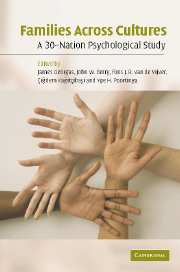Book contents
- Frontmatter
- Contents
- List of figures
- List of tables
- List of contributors
- Acknowledgments
- Prologue
- Part I
- 1 Families and family change
- 2 Cross-cultural theory and methodology
- 3 Theoretical perspectives on family change
- 4 Family portraits from 30 countries: an overview
- 5 Hypotheses
- 6 Methodology of the study
- 7 Results: cross-cultural analyses of the family
- 8 Synthesis: how similar and how different are families across cultures?
- Part II
- Appendix
- References
- Index
1 - Families and family change
Published online by Cambridge University Press: 10 December 2009
- Frontmatter
- Contents
- List of figures
- List of tables
- List of contributors
- Acknowledgments
- Prologue
- Part I
- 1 Families and family change
- 2 Cross-cultural theory and methodology
- 3 Theoretical perspectives on family change
- 4 Family portraits from 30 countries: an overview
- 5 Hypotheses
- 6 Methodology of the study
- 7 Results: cross-cultural analyses of the family
- 8 Synthesis: how similar and how different are families across cultures?
- Part II
- Appendix
- References
- Index
Summary
INTRODUCTION
The family has been studied within various disciplines, including sociology, cultural anthropology, psychology, education, psychiatry, economics, and demography from the early nineteenth century. This chapter will focus primarily on sociological and cultural anthropological studies of family, with some reference to psychological studies. Chapter 2 by John W. Berry and Ype H. Poortinga will present cross-cultural theory and methodology and its relationship to the study of family. Chapter 3 by Çiğdem Kağıtçıbaşı will present theoretical perspectives on the family, and psychological aspects of the family.
The first section of this Chapter discusses definitions of the family. The definition should be universally applicable across all cultures, account for the variety of types of families, and for recent developments such as the increase of cohabitating, unmarried parents, one-parent families, and homosexual families.
The second section discusses the sociological family theories of the nineteenth century, which presented basic issues related to family change in response to industrialization and urbanization. Family sociology played a major role in the study of family change in the twentieth century, with the theory of Parsons its most seminal influence. Cultural anthropology differed from sociological theories in that it explored the diversity of family structures and functions in thousands of small societies throughout the world, rather than primarily in Western societies, and it continues to influence studies of family and family change.
Family change in Europe, the United States, and Canada is discussed in the next section.
- Type
- Chapter
- Information
- Families Across CulturesA 30-Nation Psychological Study, pp. 3 - 50Publisher: Cambridge University PressPrint publication year: 2006
- 20
- Cited by

